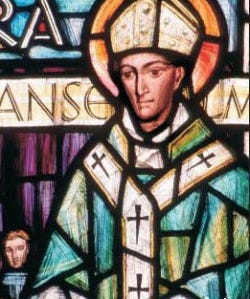Is there Faith in the Classroom?
Was George Michael right? Do you “gotta have faith”?
Last week I started my second year of teaching Catholic theology at Boston College. I have the same core course as last year (“Exploring Catholicism”), but the shift from 8am to 2pm has led my class roster to double in size. I’ve made some minor changes in topics, texts, and assignments, but I continue to wrestle with the questions I had at the end of last year.
The topic of faith in a theology classroom raises two questions: what do we mean by “faith” and by “theology”? In the first class, I told my students to think of theology as Anselm’s classic definition, “faith seeking understanding.” If that’s a good description, then we cannot do theology without talking about faith. Yet this does not necessarily imply that either the teacher or the students must have faith themselves. One could be (or become) quite knowledgeable about the claims of a religious tradition without agreeing with that tradition or finding it a meaningful accounting of reality. If this is true, then we must make a distinction between learning theology, which may or may not involve one’s personal faith, and doing theology, which necessarily does.
However, one of my objectives in teaching theology is to train my students to think theologically – to be theologians, at least in a provisional way. To get my students to see themselves this way requires me both to establish that the goal of the course is not to convert them to Catholicism (or my personal belief system) and to encourage them to pursue the deep questions they have. David Tracy says that central to the claim that theology is a public discipline is the fact that the sorts of fundamental questions theology responds to occur to any intelligent, reasonable, responsible, self-reflective person. These fundamental questions point to what Paul Tillich calls our “ultimate concern,” the reality to which the whole of one’s life is oriented. Thus on the question of what we mean by “faith,” I’ve found it helpful to encourage my students to think of faith in light of whatever it is that gives meaning and purpose to their lives.
When successful, this has helped students to find a point of access to doing theology. It helps to make sense not just of the facts of the history of Catholic theology but also of the reason why so many of us commit ourselves to working in the tradition. While my students and I might derive meaning and purpose from different sources, the similarities in our motivations help us to understand one another. Thus the hope is that by the end of the semester, students will have a deeper understanding of the Catholic faith even if it’s not one they share.
With faith in the classroom, it seems to me, we ought not to assume or expect or even necessarily to hope that the students and the teacher share the same faith. While it’s possible that this will happen, it seems more important to me to train students in ways of ways of asking and thinking about fundamental questions of existence. While there’s always the risk that faith will become a lowest-common-denominator concept for my students, emphasizing the “seeking understanding” aspect of theology places the onus on them to take these questions seriously, to continue to question, to entertain doubts, and to converse with those who disagree. With a course on Catholicism such as mine, then, the Catholic tradition becomes a privileged partner in that conversation, representing a complex and diverse set of responses to these fundamental questions. The goal then isn’t to get them to agree with the Catholic faith, but to have a serious conversation with it.




